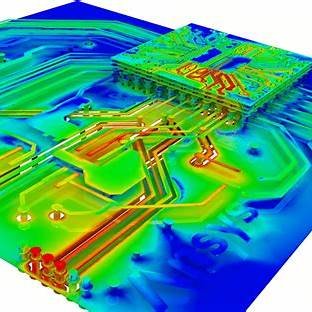Electromagnetic Emissions and Mitigation Design Software Modeling Service
ELEXANA – Precision Modeling for Safer, Cleaner EM Environments
Elexana now offers advanced electromagnetic modeling and mitigation design services, enabling clients to visualize, assess, and refine electromagnetic field behaviors before physical prototypes or installations are completed. Using industry-leading simulation platforms such as ANSYS HFSS, CST Studio Suite, and COMSOL Multiphysics, we simulate EM propagation and shielding behavior across frequencies ranging from DC to 100 GHz and beyond.
This service is essential for developers of electronic products, antennas, PCB assemblies, high-voltage systems, and critical infrastructure, including transformer vaults, substations, and hospital equipment.
Service Categories and Capabilities
Radiated Emissions Modeling
Near- and far-field radiation simulation from electronic assemblies and enclosures
Field strength projections in 3D environments
Ground plane interactions and cavity resonance modeling
(Suggested image: 3D simulation of RF radiation from an enclosure using ANSYS HFSS)
Magnetic Field Simulation (Low-Frequency and Static Fields)
AC magnetic field mapping from power transformers, inductors, and high-current busbars
Static magnetic field interactions with ferromagnetic materials and magnetite
Long-term exposure mapping for human biological safety assessments
(Suggested image: Vector plot of low-frequency magnetic field around a power substation)
RF Shielding Effectiveness Modeling
Plane wave attenuation through walls, mesh, films, and custom shielding composites
Time-domain reflectometry for pulse attenuation diagnostics
EMI gasket and aperture leakage modeling
(Suggested image: Cutaway diagram showing shielding performance across materials at various GHz bands)
PCB EMC and Signal Integrity Modeling
Crosstalk, trace impedance, and differential-mode emission modeling
Return path discontinuity analysis
High-speed interface design optimization
(Suggested image: PCB layout heatmap showing differential pair emissions in the MHz range)
Electromagnetic Compatibility (EMC) Pre-Compliance Simulation
Mode-stirred chamber simulations
Coupled field analysis for enclosure design
Immunity response testing under IEC 61000-4-X conditions
(Suggested image: Simulated result of an RF burst penetrating an unshielded chassis)
Antenna Design and Coupling Analysis
Custom antenna gain pattern and radiation efficiency modeling
SAR and human proximity impact modeling
Inter-antenna coupling in crowded RF environments
(Suggested image: 3D polar radiation pattern with peak gain markers)
EMF Safety and Exposure Modeling
IEEE C95.1 and ICNIRP guideline comparison overlays
Occupied space modeling in workplaces, data centers, and residential spaces
Long-duration exposure modeling with biologically-based precautionary overlays
(Suggested image: Office floor plan with µT contours showing hotspots from server racks and panels)
Custom System Optimization
Grounding loop interference modeling
Shield-current bypass optimization
Smart grid and powerline interference reduction
(Suggested image: Schematic of a building ground system showing induced current distribution from AC mains)
Industries Served
Medical Device Manufacturers (EMC validation and shielding)
Aerospace and Defense (MIL-STD-461/464 readiness)
Data Centers and Smart Buildings (EM-safe system design)
Power Utilities and Industrial Plants (NESC/IEEE-519 harmonics and field control)
Product Designers and OEMs (FCC and CE EMC pre-certification support)
Why Use Elexana for EM Modeling?
In-house engineers specialized in EMI/EMC and electromagnetic health effects.
Cross-domain simulation capabilities: electrical, thermal, magnetic, and biological integration
Custom material libraries, including biological tissue and biogenic magnetite interaction modeling
Human-centered mitigation approach: Not just shielding, but design for harmonic coexistence
Deliverables
Full simulation report with visuals, analysis, and compliance benchmark alignment
3D and 2D field distribution plots
Annotated risk maps for installations and product designs
Written mitigation recommendations and design revisions
Proprietary guidance integrating ANSI, IEEE, ICNIRP, and FDA guidelines




